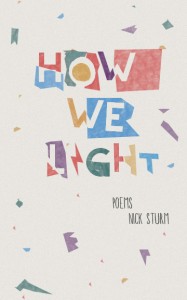A Review of Nick Sturm’s How We Light
 How We Light
How We Light
by Nick Sturm
H_NGM_N BKS, June 2013
104 pages / $14.95 Buy from Amazon or H_NGM_N
“One traverses the same paths of thought as before. Only they seem strewn with roses.”
– Walter Benjamin
A question I’ve learned to ask my students this semester is, “What did this book of poetry make your body do?” I ask this 1) because it’s a question that has nothing to do with proving that you understood a book and everything to do with articulating an experience you had with a book 2) because it steers students away from focusing on “disliking” and “liking” and steers them more into intuitive, momentous ways of thinking that help us get unstuck / stuck into more complicated ball pits like: Did the lemonade in this book (“I drink lemonade and migrate into a system of becoming” – “I Feel Yes”) taste like it was made from concentrate or by hand? How does the repetitive presence of lemonade twist and gut the aphorism, “When Life Gives You Lemons, Make Lemonade?” Can a sour nest of pressed pulp devolving into a drink that tentacles us to words like brightness, warmth, shine be considered a kind of (un)holy transformation? Is that what your throat’s Charley Horse is telling you? 3) if students don’t learn that poems should do more than sit on a page, if students don’t learn that NOT feeling something grip or rip you is an indication that something is wrong, then I don’t know what we are using these institutions of higher yearning for.
Q: What did How We Light make your body do?
A: Bargemusic
It’s a question that’s not easy for students to answer, mostly because they are not used to incorporating their sensory organs into their thinking. They are often overwhelmed by the idea of paying attention to those reactions, by taking cell inflammation and disruption seriously, by collaging it with the logical systems of reading comprehension that are pressed and pressed into them. Lisa Robertson says a simple thing in her essay, “Time in the Codex,” from the book, Nilling, “I feel astonished that any institution could have placed [a book] in my hands, then left me alone with it. Reading misuses privileges, abuses authorities, demands interference.” Is reading and experiencing reading always volatile? I think the answer might be Yes in a way that makes me consider whether or not volatile-ness is inherently violent or violence making, whether interference is inherently violent or violence making. I forget that power is not only a thing that is stolen or improperly kept. In Robertson’s insistence and word choice, there is a leaning into the ways in which the existence of the book and our ability to digest it defies the way transformation and permission is distributed. Free Pattern Tune-Ups. Free Limb Loosening. Free Energy Glisten. A different kind of Universal Health Care. Will you open yourself up? Will you receive these things? It occurs to me that I don’t register enough how INDULGENT the act of reading is. It occurs to me that this quote is making me re-define these words, volatile, indulgent, in charged ways that I wasn’t planning on. I am beginning to associate them more thickly with pleasure and the detection of shifts. But then again, I read because reading is always interfering with the rituals I use to create expectations. It is always updating my machines. Reading is the experience of inhaling process and practice and building and force without expecting to feel recognition, nodding, without expecting to feel that what we glimpsed was completely representable. Bruce Andrews on Gertrude Stein: “Here, the meanings we construct are not compensatory. Readers don’t perform some co-invocation of a lost or ever-receding presence. This isn’t reading as containment, or rollback, but as extension.” I dream about bridges. I dream about the possessiveness reading abandons. I dream about soft gauze killing my boundary waters. Sometimes I make a sandwich and watch everything do more than I could imagine. (“Beautiful beautiful Animal / animal” -Upstairs With His Sandwich) Ben Mirov says, “Just as artists and writers have imagined sentient machines in their work, so too is it possible to imagine a poem that is imbued with qualities beyond the structure of its coherent materials.” Poor statues. They don’t move. They don’t grow kites out of a shoulder.
Q: What did How We Light make your body do?
A: “A man who doesn’t love easily, loves too much.”
– Special Agent Dale Cooper
I am not a person who comes easily to joy. Or rather, I feel joy constantly. There are dead leaves outside right now that smell like parts of the earth I’ve never seen. I walk to school everyday for the first time in years and listen to these songs that cover my organs in gold paper so hard I have lay down in the wilds. But it also hurts. It feels turbulent! The intensity of it, the impact of radical immediacy, how it seems tied also to my ability to feel immensely dented by you and everything else touching me. Can I survive it? I’m not convinced How We Light is a book that comes easily to joy, either, though it is often the first thing one can and should note about Sturm’s poetry, about where his poetical contraptions get their antifreeze. The texture of How We Light’s exuberance is pulpy, palpable, pulse-ridden.
“Why something in a word out of its body
makes me feel everywhere as air, air that lives
in mouths and birds all peach pie and dynamite”
– I Feel Yes
You know what chainsaws actually are? They are exclamation points. Boorish and toothy hounds. “My actions are excessive!” -I Feel Yes. You know what exclamation points are? Exclamation points are mouths that can’t help themselves, that can’t help interfering with the steady speed limit of a page. They are the inevitable slobber marks of awe force making you and the text slippery. They litter the fourteen pages of dawn and rumble that “I Feel Yes” is, one of two long poems that appear in How We Light. These moments of exclamation / proclamation / declaration aren’t enacting a refusal to be left out, though. They aren’t a power grab. Their presence isn’t one that feels aggressive or forceful here or in one of the titles which repeats nine times throughout the book, “What a Tremendous Time We’re Having!” They aren’t demanding attention in that way, which is exactly why I am drawn to them, why I’m whelping for them in this book’s terrarium, underlining away. They are, like lemonade, pure-ish in the mane and straightforward. “O human trying! O American bison!”- I Feel Yes

A Still From Doug Aitken’s Migration
What’s different, inside the frame of “I Feel Yes” and the book, is that these moments of joy, of piercing through, aren’t privileged. They aren’t positioned to make the reader look at and admire them for their unbridled side heaving or for their half court language shots. In the other long poem, “How We Light,” and in many of the other poems in the book, punctuation is removed, floating all seismic activity and feeling together into an enjambed collectivity (co-trembling). This is a whole body accounted for and throwing waves at and through itself.
“When I speak it is the opposite of bones
Real life bones, my name on my hands.
I understand now, the valley full of brains.
Let’s have a conversation using only our skin.”
– “I Feel Yes”
December 13th, 2013 / 11:05 am
circa 28 Points: A Basic Guide by Nick Sturm
- I saw Nick Sturm once in a dive bar, I think. He had a ponytail. I thought, “I like guys with ponytails.”
- The cover of A Basic Guide is either a yarn mobile, the meanderings of a dragonfly when stimulated by a drop of sugar, or a rough sketch of a sailing frigate. It’s by Amy Borezo, who has a history of time and motion, intersections of paper, interactions of words…It seems an apt choice for a book cover, this artist.
- I have a ponytail. My enjoyment of ponytails is entirely self-serving. It makes me feel less alone.
- A guide is an appropriated form. The world is potential structure. Lorrie Moore wrote a guide. Ander Monson wrote a guide. Here’s a cool one by Melanie Rae Thon. A guide seems to imply an alembic of knowledge, this idea possibly used as ironic, as conceit, or as straight up earnest.
- It is not light that we need, but fire; it is not gentle shower, but thunder. We need Sturm, the whirlwind, and the earthquake.

- There is a wistful nostalgia here that kindles of Richard Brautigan. This longing is transferred through an accumulation, not through explicit yearning, so then A Basic Guide becomes a sort of kitchen drawer or curio cigar box—it shows, but yet stores away, creates a poetic idyll, a space: horses, petticoat, jubilee, levee, these types of wonderful that might be leaking away, might be in need of storage, little mysteries to keep in a Mason jar.
- “The way the kiss stays locked in the machine.”
- “…but the past was like a bleached coral reef.”
- Once my ponytail was “He’s sort of a cute hippie.” Now my ponytail is all, “age-inappropriate/flaky/I bet he has a ‘writer satchel’/guy you see at AWP” sort of thing. But that’s OK. Things change. Like can be hard, but there are beautiful things, too, you know. READ MORE >
